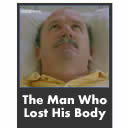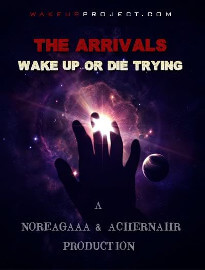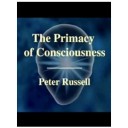The Man Who Lost His Body
 In 1971 Ian Waterman was a butcher on Jersey. He was nineteen, newly qualified and working flat out to make a go of the business. Then suddenly he went down with what seemed to be gastric flu. But it wasn't. He became wobbly and weak. Within days he had collapsed and was in hospital, unable to move or feel his body.
In 1971 Ian Waterman was a butcher on Jersey. He was nineteen, newly qualified and working flat out to make a go of the business. Then suddenly he went down with what seemed to be gastric flu. But it wasn't. He became wobbly and weak. Within days he had collapsed and was in hospital, unable to move or feel his body.
He has never regained that feeling, yet against all the odds, he has made an apparently miraculous recovery. HORIZON tells Ian's extraordinary story. Ian had contracted a disease of the nervous system so rare that the doctors on Jersey were unable to diagnose it. It had destroyed all the sensory nerves responsible for touch, and for conveying information about muscle and joint position, senses so fundamental to our capacity to move in the world that they have been called a sixth sense.
Without this "proprioception" we can have no inner sense of posture or limb position and cannot initiate or control movement. Ian was told that he would spend the rest of his life in a wheelchair. But Ian wasn't paralyzed, and he was determined that he was going to lead as normal a life as he could.




I have a student who has Global Development Delays with Dystonia. Also has residual visual functioning.
How can help my student to learn to walk. He uses his wheelchair and learning to walk using his Grillo Walker. He finds difficult grading his steps as if he does not have any control over his legs. His clasped his hand on the midline and occasionally both hands flies off and can hurt people sitting next to him. He cannot have a grip over any objects and therefore unable to hold his Grillo Walker handle either.
Any suggestions will help this young man.
Thank you
This is a superb presentation. I'd like to beg the producers' indulgence to make a point of suggesting to Mr. Waterman that he immediately appropriate a pair of sports eye wear. Something along the lines of a racquetball goggle. Protective eye is made very fashionably now days. I hope the reason I suggest this is immediately clear.
I am of course impressed by Mr. Waterman's personality traits that have allowed such successful compensation for what would otherwise be completely debilitating. I hope the brain/personality plasticity specialists are taking advantage of this opportunity to the extant that Mr. Waterman can tolerate it.
Rhea,
Your student already has the greatest possible asset - you. I hope you will stick with him. I am not a movement specialist, but due to other medical issues, I do have thoughts that may be of some utility. As much possible, if you can appeal to his development of acumen using other senses. If his hands can be restricted _only_ to where those around him are protected and not otherwise limiting his movement - that's of course ideal. He may find that restriction intolerable. I think what we learned from Ian Waterman is an approach incorporating what command he still had, and developing that as compensatory for the lack of nerve input. I imagine the biggest hurdle may be retaining the confidence that it can happen with appropriate commitment.
These are not the only cases. Every person with EDS6a has proprioception deficiency. Unfortulately we can't walk even on our knees because of other symptoms.
I saw this documentary when it first came out on the BBC in 1997 or 1998, and was really struck by Ian's courage and fascinated by how he learned to walk, and had to look at his legs all the time. Then in 1999, I had a back operation on my thoracic spine and was left with one paralysed leg, which also had no proprioception. It was thanks to seeing this documentary that I managed to get some movement back in my leg, and I remembered so well that visual connection with the part you are trying to move. I also have to look down when I walk to see where my leg is, and so often I have had therapists and other people say to me: "Look up when you are walking". But if I do that, I sometimes think I HAVE moved my leg, and go to stand on it, but it is still behind me … Thank you for making this documentary - I am sure it has helped many other people as well. I certainly have never forgotten it.
What an amazing man! I am so in love with this site. Thank you so much BBC for all of these wonderful documentaries! I've learned so much about so many interesting and inspiring people.
A very interesting, yet scary, doco. Looks like this tape was made in 1998, so wonder how he is doing now. One very brave and determined man. Great video - thank you
Credo di avere simile patologia conseguente a problemi cerebellari.
Saluti
@Eric
What an inspiring doc. I feel for him .
Hey Eric, suppose one of your family members (God forbid)were on their death bed and they believed in God and some selfish person went into the hospital and told them that there is no God so you might as well just go ahead and die. Do you think that would make your family member comforted in their last days on Earth? So what that YOU don't believe in God. At least your family member will be comforted in their last days. Who are you to take that away from them. That ain't right,man. That's just plain cold hearted and f^cked up. Some people have been through a lot in their life time and disassociated themselves with God. Saying such things like "Well if there was a God he would'nt let such things happen". That's all good and fine but to tell someone that does and is about ready to go there's no hope...well.
I don't recall seeing Ian citing "God" frequently.
god has nothing to do with your recovery my friend,dont sell short the hard work you've done and hardships you've had to endure to an imaginary being in the clouds. Be proud of yourself and what you have done. :)
wow, great documentary! thanks!
BBC - always the best docos.
i am thin want to get little fat because of thin my confident level is decreasing
Being a little too thin is far healthier than being a little too fat. Your confidence should be bolstered by the fact that your body is being healthy. As you can be happy with that, your confidence will grow.
I can't believe anyone would give this documentary anything less than a "10"! Truly amazing. I had Bell's palsy when I was 18 and I understand the "panic" of loosing your abilities, literally overnight. Had I not been 18, I might not have made a full recovery now. God was merciful to me.
What an inspiring film! Thank you Ian for sharing your story. Keep the faith!
Wow, you are awesome.